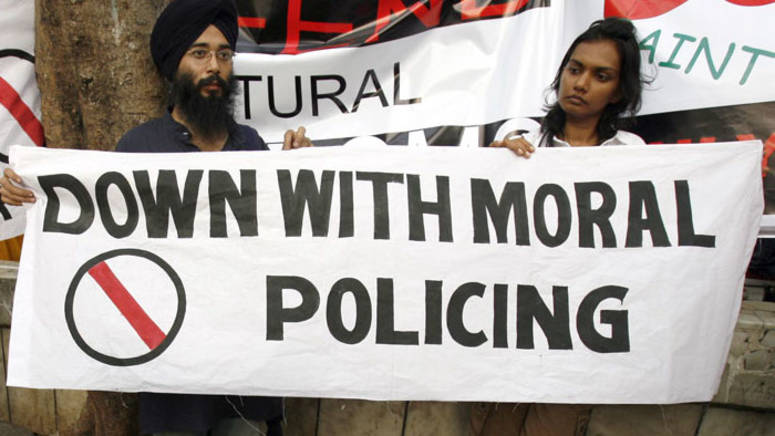Moral Policing in India
Written By – Eshna Sharma
Moral policing is an umbrella term that refers to groups that take vigilante action and believe themselves to be the upholders of culture. They act towards enforcing a supposed ‘moral’ code or a modesty code. Known by different names in different countries, such as chastity squad, modesty patrol, or the Islamic religious police in some Muslim-dominated countries, in India these vigilante groups are known as the moral police.
India has proved time and again, to be a place where freedom, sexual or otherwise, and individual choice are often overruled by societal norms, and by certain religious outfits which try to dictate peoples’ lifestyle choices, from the food they eat, to the clothing they wear to the people they marry. People are beaten up for consuming beef, harassed, tonsured, paraded in open fields for marrying outside their caste, slapped with obscenity cases, threatened with violence for the simple act of expression of views.
Vigilante groups are known to harass innocent couples in malls, parks and other public places, often humiliating them, issuing threats and asking for their parents’ numbers. Many hindu right wing outfits, like the Shiv Sena also oppose the celebration of Valentine’s Day and threaten to marry off couples found spending time together on this day. They also attack and damage gift shops selling valentine’s day gifts and cards as well as restaurants. Members of religious fanatic outfits often protest against western cultural imports.

Unfortunately, moral policing is not just done by vigilante groups but also by the police. The police is a distinct public organisation and is entrusted with great powers to use force. Lack of sensitivity training among police personnel, as well as a toxic, patriarchal mindset entrenched in the personnel often translates to moral policing by those who are supposed to be the enforcers of law and protectors of the public.
The police often harass couples and take them into custody on the basis of flimsy charges of ‘public indecency’. In 2015, the police conducted raids in a Mumbai suburb. An excerpt from a report on it says, couples who had checked into the hotels for privacy were shocked to find the police knocking on their doors. They were pulled out of the rooms and taken to a police station and allegedly even manhandled for being “caught” for “indecent public behaviour”. Many were let off only after being questioned for hours and after having paid a fine of 1200 rupees, and the police even made some of the women call up their parents and thus humiliated them.
Time and again, the police have also made the news for launching various women safety measures that took a turn for the worse and resulted in the harassment of innocent couples and faced a lot of flak from the public.
In 2011, the Ghaziabad police launched “Operation Majnu” and caught couples in parks and made the men do sit-ups in front of TV cameras.
An initiative launched under the Yogi Adityanath government in UP, known as the ‘Anti-Romeo Squad’ involving police personnel–both men and women– in plainsclothes, deployed at public places such as malls and parks to curb harassment against women, have been embroiled in controversies from day one as reports of police excesses poured in from all corners. A newsreport says- “A movie-going couple was dragged out of their auto rickshaw and dragged to the police station in Lucknow, a young man was forced to do sit-ups in Jhansi and several young men were rounded up in Meerut for accompanying their sisters to the college.”

The Section 294 of the Indian Penal Code, dating back to the 1860s, which is often applied by the police when moral policing, deals with “obscene acts and songs” and it states that:
Whoever, to the annoyance of others
(a) Does any obscene act in any public place, or
(b) Sings, recites or utters any obscene song, ballad or words, in or near any public place,
Shall be punished with imprisonment of either description for a term which may extend to three months, or with fine, or with both.
There are no clear definitions on what exactly constitutes an ‘obscene’ act, and the vagueness and subjectivity allows this act to be endlessly exploited to humiliate the Indian populace.
Immoral Traffic (Prevention) Act, 1956 (also known as Prevention of Immoral Traffic Act or PITA) was originally passed to prevent human trafficking. It allows police to raid hotels if they suspect a sex racket is being run there. Police have used this law to raid hotels and arrest consenting couples.
This Independence day, as the country grapples with a virus that has brought entire nations to their nations, an increasingly crippled economy, rising communal disharmony, a state remains under complete lockdown for a year and counting, we must ask ourselves some tough questions.
In a country that fought against tyrannical subjugation for centuries, sacrificed countless lives to achieve a free state, where all enjoy equal rights and status, how free are we? To hold hands in public, to sing our songs, say our speeches, to love who we love, out and proud?
Are we shacked, or are we free?
Author

